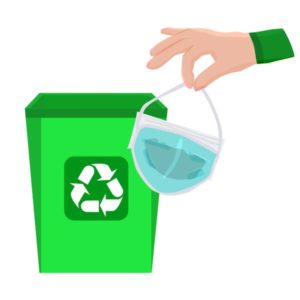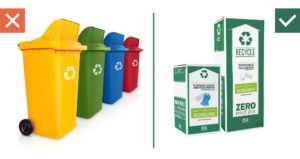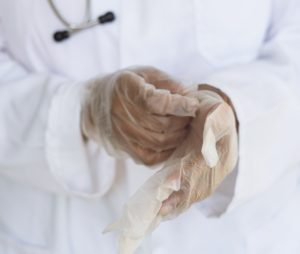From the beginning of the pandemic, PPE has been in high demand and in heavy use. Due to its single-use nature, it’s leaving a damaging mark on the environment. In Spain, the amount of medical waste generated has increased by a staggering 350%, while China has seen an even bigger surge in medical waste, with 370% more being produced now than before the pandemic.
Most PPE is made from non-biodegradable, single-use plastic, and experts estimate that around 75% of it ends up in our landfills or oceans. One recent report found that without action, the annual flow of plastic into our oceans could triple to 29 million metric tons by 2040. However, most of the research for this report was completed in a pre-COVID world, and the report hasn’t been updated to take into account our new reliance on PPE.
This means that our masks, gloves, and other single-use items will sit in landfills long after the pandemic has drawn to a close, and we need to find better ways to dispose and recycle PPE and other associated materials.
The future of PPE use
The sharp uptick in the use of PPE shows no signs of slowing any time soon. Most countries still have mask mandates in place and many offices, hospitals, care homes, and other institutions are expected to continue enforcing mask policies and other mandatory PPE usage for the foreseeable future.
Between 2016 and 2020, the compound annual rate of increase in the global market for PPE was 6.5%. From 2020 to 2025, experts predict that the compound annual growth in facial and surgical masks alone will be around 20%. That’s on top of the huge increase in production we’ve already seen over the past 12 months.
With this challenge in mind, how can we begin to address PPE waste in a sustainable way while also ensuring safety and hygiene standards are not compromised? Here, we take a look at a few approaches and innovative new technologies that may make a difference.
Plastic recycling
One of the many potential solutions to our global PPE challenge can be found in the UK. Welsh-based company Thermal Compaction Group (TCG) has created a process that allows hospitals to turn their plastic waste into compressed plastic pellets. Previously, the company’s Sterimelt technology was used to make new plastic products like hospital furniture and bins by heating plastics to 350 degrees Celsius and then compressing it into rectangular blocks for later use.

Source: medicalplasticsnews.com
This year, TCG has begun working closely with Hardshell, one of the UK’s first FFP3-grade mask-making facilities, to trial a process where Hardshell’s defective disposable face coverings and other PPE items are processed through TCGs machines. It’s hoped that this system can be extended to cover all items of PPE, but for now Hardshell is significantly reducing its pre-consumer waste stream.
Previously, any items processed by Sterimelt would have been incinerated or sent to landfill, and the company estimates that for every 10,000 kilograms of waste processed through Sterimelt, hospitals can save 7,500 kilograms of carbon dioxide emissions. TCG has now signed a number of deals with hospitals around the world and has recently agreed to supply the US Navy with a similar technology called Massmelt.
In the future, TCG hopes that Sterimelt can be used to 3D print medical equipment to create a low-waste circular solution that could prevent hundreds of tons of plastic from ending up in landfill.
Plastic to plastic conversion
As the result of a collaboration between Stanford University and Sweden’s Blekinge Institute of Technology, another solution could help with the PPE challenge. The project is focused on finding ways to recycle single-use plastic gloves. At the moment, plastic gloves make up around 44% of PPE waste, so finding a sustainable way to reuse these products will make a big impact on the amount of PPE that ends up in the environment.
The project is called Reglove, and it aims to produce and recycle gloves made from polyvinyl alcohol (PVA). This water-soluble polymer can easily be dissolved, sterilized, and then remolded in a machine that shreds and rinses the material before dissolving the PVA and turning it into a fresh pair of gloves.
The final goal is to install these machines on-site, allowing hospitals and laboratories to manufacture sterile gloves from used pairs without plastic ever leaving the premises. The innovators behind the project hope this technology will allow all institutions that rely heavily on PPE to recycle plastics quickly and easily, virtually eliminating waste in the process.
Reusable PPE
Reducing the amount of PPE going to landfill includes the use of more sustainable, reusable material alternatives. While this isn’t an option in all settings, there are a number of scenarios in which reusable masks, visors, and gloves can be worn in place of single-use versions—particularly within consumer markets.
Today, health experts around the world are calling for more robust PPE that can be properly sanitized and reused, as well as a shift in attitude that conserves single-use equipment for those that need it most—namely hospitals, other healthcare facilities, and those services considered frontline.
The UCL Plastic Waste Innovation report estimated if all members of the public wore reusable masks instead of single-use masks, waste could be reduced by an incredible 95%. If new reusable alternatives were found for other types of PPE, it could have an even more significant impact on waste and help to dramatically reduce the amount of plastic going to landfill or being incinerated.
Increased recycling

Source: terracycle.com
Numerous organizations are already pushing for an increase in public PPE recycling, as well as providing viable waste diversion programs to ensure waste is dealt with correctly. One such company, TerraCycle, offers a range of zero-waste boxes that can be placed in public spaces designed specifically to collect used PPE. When full, the PPE is sorted, cleaned, and melted into plastic pellets. These pellets can then be used to create other plastic products.
Providing large-scale, public recycling facilities for PPE is the best way to ensure that masks, gloves, and gowns aren’t disposed of inappropriately. These types of programs will require investment if they’re going to make an impact.
For more information about responsible waste management for your business, and how to correctly recycle PPE, speak to one of our TRUE Advisors today or subscribe to the RTS blog.





